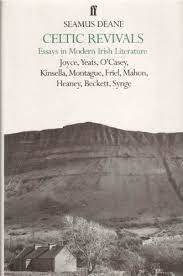Reflection: Clair Wills
We are grateful to Professor Clair Wills for permission to reprint her reflection, one that originally appeared in The Irish Times. Other reflections in that edition can be found here.

This afternoon I took down from my shelves my copy of Seamus Deane’s Celtic Revivals, his book of essays on Joyce, Yeats, Beckett, Montague, Heaney and Friel, among other twentieth century Irish writers. Published in 1985, just as I was finishing my undergraduate degree and wondering what to do next, this was my first, formative encounter with Seamus’s work. Concise, distilled, knotty, trenchantly argued and continually surprising the essays look short on the page but they stay long in the mind. Very long in my own case.
I still turn to this little book when I’m preparing teaching, when I need to get my brain working. He had a brilliant knack of zooming in to details of literary style in a way that would unlock a writer’s secrets—like giving his reader a key into a world of Irish history, politics, culture and learning. His students at UCD had been getting the benefit of his way of reading for years of course.
But with Celtic Revivals and An Introduction to Irish Literature, published the following year in 1986, he sent a generation of young critics in Britain and the United States off to emulate him. When, in 1996 he published his superb novel Reading in the Dark—can anyone forget the simmering rage in that novel as the young protagonist tries to speak and cannot speak, uproots his father’s roses instead, or tells his story in Irish—we knew we would never catch him!
Later, when I met him, while working on the Field Day Anthology Volumes 4 and 5, I found all that sharpness and intelligence embodied. The debacle over the women missing from the first three volumes of the Anthology might have been anticipated by the list of male writers that were the subject of the essays in Celtic Revivals.
But Seamus was able to acknowledge his blind spots, and spent 10 years supporting our work on the subsequent volumes. What I remember, and what I will miss, about Seamus is his literary genius, but also his kindness. He was unfailingly generous to a young scholar finding her way. And he was frequently very funny. He once told me a winning story of how, as a bookish child, much given to reading the encylopedia, he had become fascinated by that place called ‘Circa’, where all sort of interesting things had happened. Born Circa 1500; Built Circa 1860. I think of him, ferociously hungry for knowledge; able to admit ignorance. Both qualities were key to his extra-ordinarily capacious intelligence.
Clair Wills is the King Edward VII Professor of English Literature at Murray Edwards College, The University of Cambridge. She has been a frequent visitor to the Keough-Naughton Institute, and was the O’Donnell Distinguished Visiting Professor of Irish Studies in 2012.